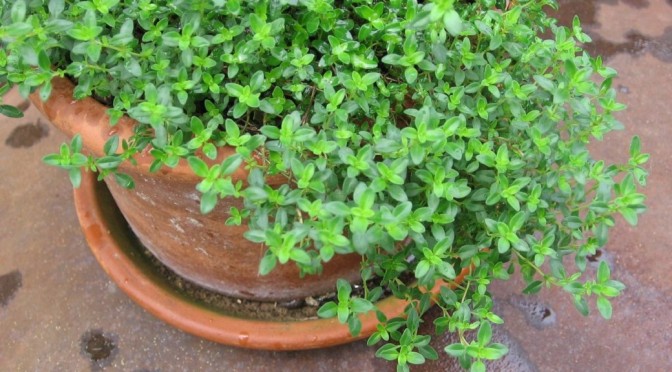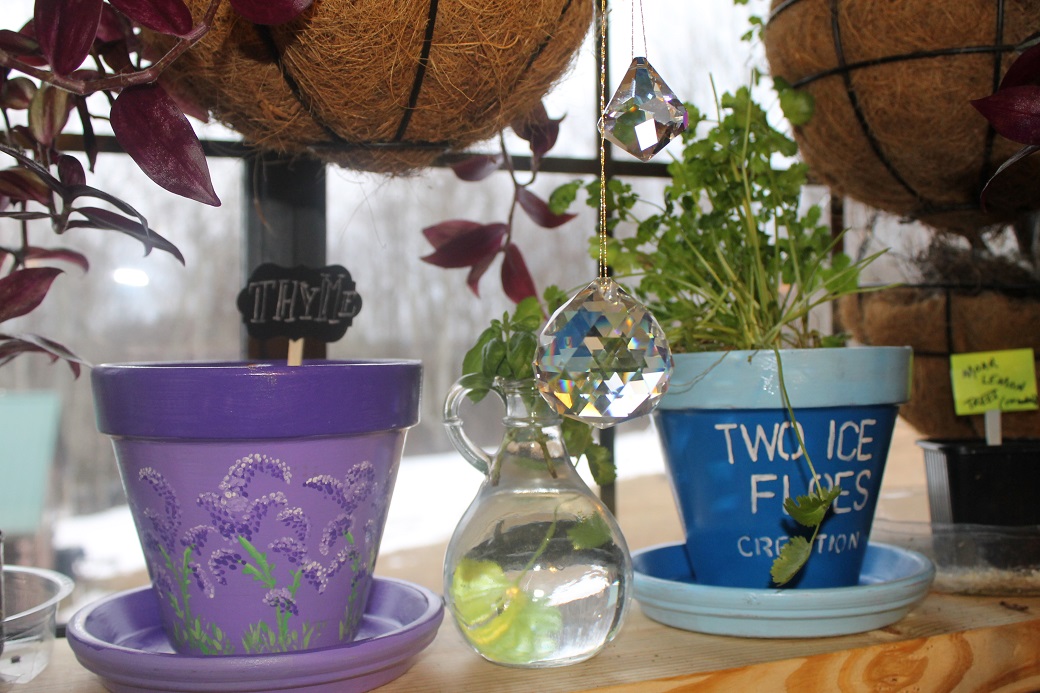From Mrs. Cog's Corner
The content on this page is for discussion purposes relating to health and well being only and is not intended to be medical advice. Links and sources provided are for informational purposes and do not represent an endorsement of a person, product or treatment.
Hard to fathom during the blistering cold here, but Spring is rapidly approaching. Not letting the below zero temperatures outdoors deter me from garden activities, this week I planted a variety of herbal seeds for both my indoor window garden and to transplant to the larger garden should it ever thaw.
Thyme is a priority herb on my list for both cooking and other health related uses. When I began researching the specific properties and uses for thyme other than how I presently use it, I found it has a rich history. Sumerians recorded using thyme as an antiseptic. Both Greek and Roman cultures claimed it emboldened their soldiers who bathed in it to give them bravery. In keeping with the theme of emboldening, woman in ancient cultures would wear sprigs of thyme in their hair as the scent was said to have aphrodisiac properties.
Shakespeare referenced thyme in Othello when Iago speaks of having the choice to sow his garden with it in order to manifest one’s own future courageously. In A Midsummer Night’s Dream, he reminds us that thyme’s magical effects allow us to see fairies and that the fae are drawn to its power.
Closer to home, thyme is commonly used in recipes for chicken, turkey, duck and pork. Aside from properties which help to preserve foods and eliminate bacteria which cause food poisoning, thyme is often combined with oregano or rosemary for a pleasant seasoning.
Nutritionally, thyme packs quite a punch. Full of Vitamins A & C, it contains high levels of calcium, magnesium and manganese. It can be added in soups, sauces and is often brewed as tea.
Thanks to both literature from over the ages and the advantages of modern medicine, we know thyme has potent medicinal properties. Some of its many uses include treating common colds, detoxing the liver, boosting production of white blood cells to bolster immunity and is used for many respiratory afflictions including emphysema and whooping cough. Studies have shown thyme is an effective pain reliever. Recent publications suggest thyme oil may kill 97% of breast cancer cells and is effective in combating other forms of cancer.
Thyme is also an effective anti-parasitic, internally capable of killing worms and parasites. Externally it effectively repels mites that cause scabies and also fleas and lice on humans, pets and livestock. I use thyme essential oil mixed with lemongrass and a carrier oil in the summertime for a natural bug repellant to wear in the garden and the woods that works great without the worry of any side effects from manufactured chemicals.
In clinical studies, thyme has been found to be a potent antibiotic for treating bacterial infections ranging from MRSA to acne and even pathogens that cause food poisoning. Thyme is also proven to kill bacteria that causes acne and common strep infections.
As a reminder, essential oils, the distilled and condensed medicinal properties of plants, can be acquired for a low cost. When stored in the correct manner, most essential oils other than citrus can be safely stored indefinitely and add unlimited value to a natural medicine cabinet.
Virtue? A fig! ‘Tis in ourselves that we are thus or thus. Our bodies are our gardens, to the which our wills are gardeners. So that if we will plant nettles or sow lettuce, set hyssop and weed up thyme, supply it with one gender of herbs or distract it with many—either to have it sterile with idleness, or manured with industry—why, the power and corrigible authority of this lies in our wills. – from Shakespeare’s Othello
More Thyme(ly) Information:
The International Journal of Food Microbiology as well as other institutions found that 92 percent of Gram negative and positive bacterial strains could be killed using cinnamon, thyme or clove essential oil. Here are some other health benefits of thyme. http://naturalsociety.com/10-essential-oils-detoxing/
The volatile essential oils in thyme are packed with anti-septic, anti-viral, anti-rheumatic, anti-parasitic and anti-fungal properties, which explains why thyme-based formulas are used as an expectorant, diuretic, fungicide and antibiotic. http://naturalsociety.com/health-benefits-of-thyme-medicinal-herb/
Often used in pasta recipes, this fragrant herb comes packed with nutrients that are beneficial to skin, hair and body. Here's looking at the health benefits of thyme. http://timesofindia.indiatimes.com/life-style/health-fitness/health/7-health-benefits-of-thyme/articleshow/30675353.cms
Down through the centuries it has been used for various ailments, from melancholia to epileptic seizures. In ancient times thyme was one of the first herbs sued as incense. It was often mixed with equal parts of lavender and sprinkled on the floors of churches in the Middle Ages to eliminate any unwanted odors. In ancient Egypt, thyme was one of the ingredients used in the mummification process. It has also been used as a perfume among some ancient cultures. In recent years it has been prescribed by herbalists for intestinal worms, gastrointestinal ailments, bronchial problems, lack of appetite, diarrhea, menstrual cramps, the common cold, and laryngitis. In Germany it is used to treat whooping cough and emphysema. http://www.offthegridnews.com/alternative-health/medicinal-uses-of-thyme/
Thyme is a strong killer of fungus, mold, yeast, viruses and bad bacteria. It's so strong, it's used to disinfect water in countries like Spain, Portugal, Mexico, Italy and Greece. If you have questionable drinking water, just boil it with some thyme in it, which you can buy at any store almost anywhere in the world. http://www.markusrothkranz.com/thyme/thyme.html
Thyme grows in sunny areas next to ant-hills. You can find thyme in dried up lawns, as it must have lots of sun and heat. Thyme came from the Mediterranean in the 11th century and is found in many gardens. Most people know the thyme plant as Garden Thyme (thymus vulgaris) or as Mother Thyme. http://www.naturalnews.com/027128_thyme_herb_tea.html
Due to the essential oil, the herb contains bronchial antispasmodic and expectorant properties which makes it quite useful in treatment chronic as well as acute bronchitis, upper respiratory tract inflammation, and whooping cough. Thyme can also enhance the functioning of the bronchi’s cilia, also affecting the bronchial mucosa. Thyme’s terpenoids provide the herb with its expectorant properties while the flavonoids in the herb provide thyme with its spasmolytic effects. All members of the family of mint, such as thyme, contain terpenoids that are well-known for battling cancer. http://www.herbwisdom.com/herb-thyme.html
Blended into soups and stews thyme’s essential oils, which help increase circulation, are a perfect way to warm yourself up from the inside on a cold autumn or winter’s day. Brewed in a tea thyme energises the whole system, and through its fortifying effect on the nervous system it is excellent for treating physical and mental exhaustion, tension, anxiety and depression. http://www.nyrnaturalnews.com/article/taking-your-thyme-the-tiny-leaf-with-big-benefits/


Awesome article, MrsC, and a great Shakespeare quote. I was unaware of most of the information presented here, and it sounds like just the thing to help with my present unavoidable stressors which have led to a bit of Laryngopharyngeal reflux (LPR) . I shall try this tomorrow.
And I confess, Thyme would make for a most potent and effective perfume; much better than any commercial preparation my girlfriends ever used.
Oh, ps; here in NorCal it was 84 degrees today. ;-P
Mr. Sapien – Glad you are enjoying the herbal information. I am still relatively new to natural health and the whole body wellness approach, thus my excitement. The more I discover, the more I learn I don’t know, so I just keep digging. Herbal and natural remedy articles published here on TIF over the past year can be found at Life on The Mountain.
84° really? Well, we’re working on catching up. It’s supposed to get up to 25° here tomorrow. :-)
I tried just a straight thyme tea – it works here, as advertised, ~ 4-6 hours. Sinusitis & congestion cleared up. Tasted different than I expected – I think I’ll be blending this with Cilantro.
Thanks so much.
Funny you should write this now. I woke up with a sneezing fit and saw your comment. Thank you very much for the report. :-) The whole alternative healing genre so discouraged in our society, it turns out with the lack of published results we are often our own guinea pigs. Sharing tips goes a long way.
Another natural remedy to dry up my sinuses I discovered by accident. I keep a bottle with about ten drops each of frankincense and myrrh essential oils on my desk. It has wonderful properties, although drying a runny nose and my sneezing fits was a bonus to find. I love the smell of it, but Cog rolls his eyes and says it smells like gym socks lol. I even made some salve from these oils to rub under my nose instead of Vicks Vapor rub on my sneezy days.
I did the trusty oregano oil (2) drops on a Ritz cracker smothered in raw honey last night. I ran into a drippy person at the local home improvement store and I was sneezing when I returned home. I slept like a baby and I’m good to go today:)
Mr Pepper